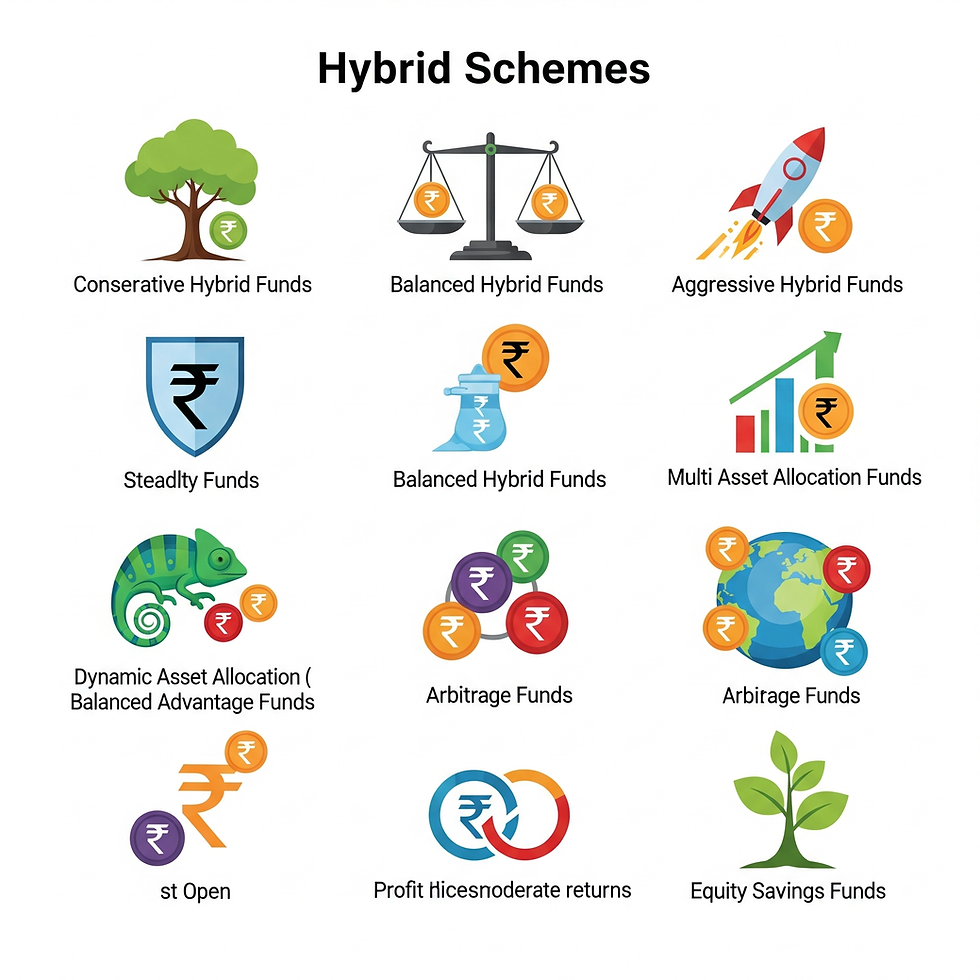Similarities and differences between the various asset categories
- M Manohar Rao
- Jun 27, 2025
- 4 min read

Tags: Wealth Management, Investment Lesson, Mutual Funds, Mutual Fund Basics, Stock market, Budget, Finance, Investing, Personal Finance, Investment, ETFs, SIP, Multi cap
Investments in equity and bonds can be done only in financial form, whereas one can buy the other two assets, viz., real estate and commodities either in financial or in physical form. It is this physical form that gives a feeling of safety to many. Anything that is tangible is perceived to be safer than something intangible.
Real estate and commodities differ from equity and bonds in another way, too. These could be bought as an investment or for consumption purposes. For example, one may invest in residential property and give it on rent to generate income. This is an investment. At the same time, one may also buy a flat to live in–for residential purposes. Such a self-occupied house may not be an investment. A similar logic may be applied to gold and silver by checking whether one has invested in the metal or bought the same for personal use.
When someone invests in equity shares, part of the profits made by the company may be shared with the investor. With a careful analysis of various equity shares, it is possible to receive a periodic income (though without any guarantee about how much would one receive, and whether one receives anything at all). Similarly, real estate could be given on rent to generate intermittent cash flow. Bonds pay interest income. It is the commodities where such intermittent cash flow is not generated.
An investor in equity, real estate and commodities is an owner of the asset, whereas an investor in bonds has lent money to someone. In such a case, the lender’s receipts—be its interest payments or return of principal amount invested – are agreed at the time of the issue of such instruments. In all the other three cases, the investor’s cash flows (or receipts) are unknown. To that extent, the future returns from these assets, which may also be called ownership assets, would be highly uncertain in comparison to the lending assets like bonds or fixed deposits.
While the above discussion was about the characteristics of various asset classes and certain differences across the asset categories, the same must be seen from another perspective, too. While one may buy equity shares listed in India in Indian Rupees, one can also invest in shares of various companies listed outside India. This provides exposure to another currency. For example, an investor buying the shares of a company listed on the London Stock Exchange is exposed to the fortunes of the company, as well as the change in the exchange rate between the British Pound and the Indian Rupee.
Similarly, one could also invest in bonds denominated in various currencies other than Indian Rupee, and one could also buy real estate abroad. These are called international assets. However, one must understand the basic nature of the asset class as discussed earlier, and then try to assess the impact of currency fluctuation on these investments.
Different investment avenues can be categorized into different asset category as can be seen from the illustration in Table :
Investment avenues classified under different asset categories

Disclaimer:
The information set out above is included for general information purposes only and is not exhaustive and does not constitute legal or tax advice. All complaints regarding Mutual Fund can be directed towards visit www.scores.gov.in (SEBI SCORES portal). Readers are requested to make informed investment decisions and consult Chaitanya Financial Consultants – 9000628943 / mfd.mmr@gmail.com to determine the financial implications with respect to investing in Mutual Funds.
Mutual Fund investments are subject to market risks, read all scheme related documents carefully.
Join WhatsApp group for better and personalised communication regarding investment lessons, advice and help.
Note: Members of our WhatsApp group will enjoy lifetime free investment advice and will not be charged any consultation fee for mutual fund investments.
Support My Mission – Your Small Contribution Matters!
I am passionate about sharing financial knowledge and guiding people toward financial independence. Through my articles, I strive to provide valuable insights that can help you make smarter investment decisions and secure your future.
If my work has added value to your financial journey, I would truly appreciate your support. A small contribution from you—whatever amount you feel is right—will go a long way in motivating me to continue creating high-quality content.
💰 You can support me via:
✔ Paytm / Google Pay / Amazon Pay: 9000628943
✔ PayPal: manomatt@rediffmail.com
Every small payment is not just financial support—it’s an encouragement that fuels my passion for educating and empowering others. Thank you for being a part of this journey! 🙏
Here’s your chance to earn extra money effortlessly. Simply refer someone to invest in any mutual fund scheme, and as soon as they invest, you'll receive ₹100 - ₹200 instantly in your bank account via Paytm or PhonePay. Start referring and start earning today!



Comments